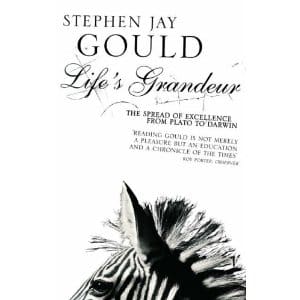Eminently readable, Stephen Jay Gould’s Life’s Grandeur is a must for anyone who wants to understand Darwin better
Stephen Jay Gould (Sep 10, 1941 – May 20, 2002) is one of the best known and most influential writers on the Theory of Evolution. The author of more than two dozen books on the subject, the scientist is also known for his theory of Punctuated Equilibrium (with Niles Eldredge).
“Life’s Grandeur – the spread of excellence from Plato to Darwin” (Vintage, 1996, current printing 2005) is a compelling and eminently readable account of one of Gould’s favorite themes — the process of Natural Evolution, which is fundamentally random and tracks the environment. Any attempt to see a trend whether by increase in size, complexity or progress on any other parameter is a statistical illusion. A quote from the second chapter sets the tone for most of the later discussions. Gould states “If we are but a tiny twig on the floridly arborescent bush of life, and if our twig branched of just a geological moment ago, then perhaps we are not a predictable result of an inherently progressive process (the vaunted trend to progress in life’s history); perhaps we are, whatever our glories and accomplishments, a momentary cosmic accident that would never arise again if the tree of life could be replanted from seed and regrown under similar conditions” (Life’s Grandeur – The spread of excellence from Plato to Darwin, Vintage 1997, pg 18)
Freud famously observed that every major revolution has done its bit to dethrone man from its self-appointed cosmic status, noting three such revolutions: first, the Copernican, which displaced Earth from the centre of the universe; the second was the Darwinian thesis that uprooted our notion of man in the mirror image of God (and almost finished off God in the process); and the third was the Freudian revolution that displaced our claim of being rational beings by the discovery of the vast dungeons of the unconscious. To this, Gould adds a fourth – the discovery by geologists and paleontologists (incidentally his own trade) that not only is Earth at least 4 billion years old, but human history, going by the fossil record, is a mere blip in time.
Faced with these facts men, egocentric and arrogant as they are, have been trying to subvert the evolutionary saga to bring in a progressive bias. Faced with the fact that we are restricted to “the last sliver of earthly time”, men have constantly been trying to show evolution in the light of series of steps leading to themselves, a last ditch effort to regain our sense of universal importance.
Gould’s objections to the Progressionist agenda are rooted in the nature of evolutionary theory itself. After a brief discussion of the nature of natural selection, he proceeds to call out the fallacies of the Progressionist argument with a vigorous attack on the pillars sustaining it, viz. an anthropomorphic reading of evolutionary trends (mainly by giving undue importance to later arrivals on the evolutionary scene), extrapolating from trends that either do not exist at all or are at best freak short-term phenomena, and a linear view of evolution resulting in a mistaken and simplistic notion of a species replacing another often in increasing order of an identified evolutionary trend.
His objection, then, is that we are forcing patterns by first selecting attributes that suit us best and then reading the trend in a manner that completely ignores the fact that the given trend is present in a tiny tail of the “Full House” (the complete assembly of species on the earth) and this minuscule sample hardly qualifies as representative of life. In other words braininess as being the exquisite preserve of mammals, which represent but a tiny fraction of total species on earth, a trend that culminates in mammals, is a gross misrepresentation of the facts of life. Most organisms have not bothered about being brainy since it does not suit their way of life (it is not a criterion for success via natural selection in their environment) and they are doing fine anyway. You might as well say that humans are the best navel-gazers and then place them at a pedestal but then most life does not bother with navel-gazing. It does not matter to them and they still proliferate. If one were to ask them they might want to use different attributes — for instance, nose lengths in the case of elephants, streamlined bodies in the case of fishes, and echolocation in the case of bats.

Gould is eminently readable and well informed. He draws upon examples from personal life (his battle with cancer), baseball (the book includes a primer for English readers) and fieldwork. He is also a skilled artist of metaphors – The Drunkard’s Walk being one. Throughout the book Gould argues persuasively about how random history (Evolution) can mislead one into believing that certain trends exist and then certain people then try to cease upon these to generalize, even call evolution progressive.
The book’s epilogue touches on Social Progress (as opposed to evolutionary progress) and there Gould springs a surprise. Like most of his output this book is indispensable for anyone trying to make sense of Darwin’s theory and its various shades.
Review by Sahastrarashmi
Photograph of S J Gould by Kathy Chapman (Wikimedia Commons)
Latest posts by SR (see all)
- Encounter: The Sacred Grove at Oorani - November 28, 2012
- Encounter: Rhododendron, sentinel of the highlands - October 7, 2012
- Manjhi Akshayavat, an immortal Banyan tree - July 17, 2012

